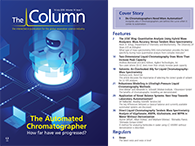The Chromatographic Society: “Grass Roots 3” Educational Event
The Chromatographic Society has announced the “Grass Roots 3” Educational Event is to be held at the Waterhead Hotel, Ambleside, Cumbria, UK, Friday 5–Monday 8 October 2018.
Photo Credit: The Chromatographic Society

The Chromatographic Society has announced the “Grass Roots 3” Educational Event is to be held at the Waterhead Hotel, Ambleside, Cumbria, UK, Friday 5–Monday 8 October 2018.
The event looks to build on the two previous events with the first being organized in October 2016 as part of the society’s Diamond Anniversary celebrations. Held in Grasmere in the Lake District, the course focused on teaching the fundamentals of liquid chromatography (LC) to graduate students and novice chromatographers from the industry. The event proved to be a success with over 20 attendees taking part spurring a repeat of the course, which was held in Church Stretton in October 2017.
This new event will build upon the fundamentals taught on the previous Grass Roots courses, focusing on reversed-phase method development for small molecules.
“The subject matter will be of particular relevance for attendees working with pharmaceutical compounds, but the concepts and approaches will be equally relevant to those working in the agrochemical, food, environmental, and other industries,” said Paul Ferguson, AstraZeneca.
The course will be delivered by a number of very experienced chromatographers with industrial experience including: Mel Euerby (Shimadzu), Tony Taylor (Crawford Scientific), Roman Szucs (Pfizer), and Paul Ferguson (AstraZeneca).
The lecture programme includes approximately 20 hours of lectures alongside a walking programme and evening events. The programme will be “fixed” content, however, there is significant scope to include additional topics as requested by attendees as well as informal discussion during social elements.
“We would also be happy to discuss any specific chromatographic queries or issues that attendees bring from their workplaces,” said Ferguson. “Attendees who wish to bring chromatography posters to the event are also welcome to do so and these can be discussed at appropriate times linked to the programme.”
The course will cover many aspects of method development such as sample preparation, gradient chromatography, modifying selectivity, detection options, quantification, method robustness, validation, and interactive practical exercises using in silico retention modelling software. The course fee includes:
- Three night’s accommodation (Friday, Saturday, and Sunday evenings)
- All meals and course refreshments (breakfast, lunch, and dinner)
- Course notes
- Certificate of attendance
- Three month’s ChromSoc membership
Full course details, bursary information, and registration may be found on our website: http://chromsoc.com/event/grass-roots-2018/
For sponsorship and other queries, please contact paul.ferguson@chromsoc.com

A Matrix-Matched Semiquantification Method for PFAS in AFFF-Contaminated Soil
Published: April 14th 2025 | Updated: April 14th 2025Catharina Capitain and Melanie Schüßler from the Faculty of Geosciences at the University of Tübingen, Tübingen, Germany describe a novel approach using matrix-matched semiquantification to investigate per- and polyfluoroalkyl substances (PFAS) in contaminated soil.
Silvia Radenkovic on Building Connections in the Scientific Community
April 11th 2025In the second part of our conversation with Silvia Radenkovic, she shares insights into her involvement in scientific organizations and offers advice for young scientists looking to engage more in scientific organizations.














